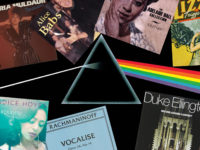NICK DERISO: When Duke Ellington strolled out on stage for this 1958 date, it had been 25 years since he’d previously appeared in Europe.
Still, though he was kept away by a war and a drawn-out dispute between the U.S. and Brit’s musicians unions, you could say Ellington had made quite an impression with that earlier 1933 show in London. Incredibly, fans showed up for this performance with programs from the last concert.
The date already had more than its share of steeped romanticism. Duke was in town in ’58 to play the Leeds Festival but, perhaps more importantly musically, to meet with the Queen: Just after that, he wrote a suite for Elizabeth, had one copy pressed and presented it to her — with the idea that it would never be heard in its entirety elsewhere.
In keeping with this moment of intensity and high emotion, “The Great London Concerts” (BMG-MusicMasters), include a number of the usual suspects over a sterling two-disc set — “Take the ‘A’ Train,” “Mood Indigo,” “Perdido” and “Don’t Get Around Much Anymore” among them — but also a probing look into his remarkable catalog. Many seldom-heard Ellington compositions are heard, and a number of others are drastically reworked.
Make special note of trumpeter Cootie Williams’ return, too. He had only recently retaken his chair, after a two-decades long run as a leader and as a sideman with Benny Goodman. His voice is somewhat autumnal (Williams was into his 50s at the time of these recordings) yet nevertheless inventive and true.
Cootie’s head on “Caravan,” for instance, is pursued in this pleading fashion — a sharp contrast to the now-familiar charging intro during Ellington’s earlier definitive version — before he relaxes into an awfully cool swing. (The liner notes suggest that Williams might have been influenced by the merry turns taken by Duke on piano and then Sam Woodyard on the traps in between.)
A wailer like “Diminuendo and Crescendo” — the singular Ellington tune that gave his group its second life stateside at Newport in the 1950s — is followed by Duke’s quite emotional solo take on “A Single Petal of a Rose” from the Queen’s suite. Then “Kinda Dukish” gets the house shaking again.
That kind of tone-perfect waxing and waning spills across the entire record, giving it a nuanced balance — though some of this could be explained away by the fact that two concerts were subsequently blended together, with later tracks mixed into the beginning and end of the discs.
Others might attribute this magic to the talent milling about on that bandstand. We have here one of the best of Ellington’s working groups, also featuring Johnny Hodges, Paul Gonsalves and Harry Carney, among others — and a Duke Ellington luxuriating in the moment.
I’m going with the latter.
- Nick DeRiso’s Best of 2015 (Rock + Pop): Death Cab for Cutie, Joe Jackson, Toto + Others - January 18, 2016
- Nick DeRiso’s Best of 2015 (Blues, Jazz + R&B): Boz Scaggs, Gavin Harrison, Alabama Shakes - January 10, 2016
- Nick DeRiso’s Best of 2015 (Reissues + Live): John Oates, Led Zeppelin, Yes, Faces + others - January 7, 2016



